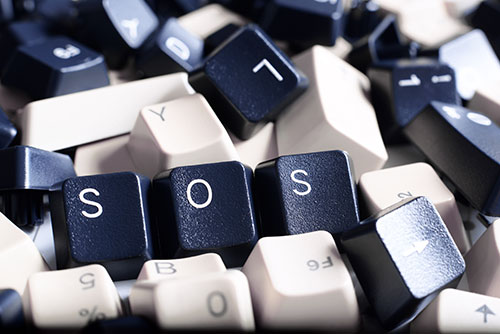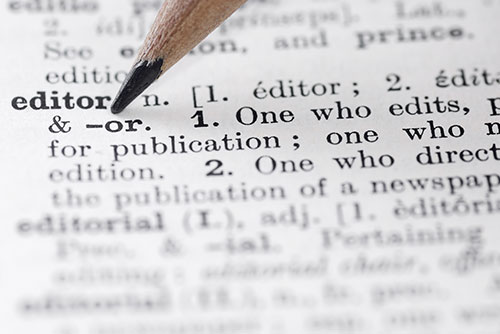Last Updated on April 10, 2023

In this piece, I address some of the questions LAEWG's editors frequently hear from writers. Editing can feel like a mysterious and open-ended process to a writer. This Q&A takes the mystery out, by describing some of what you can expect from a copyedit and a developmental edit.
Q: Help! I think I need an editor. Can you just make my book read better?
A: I hear some version of this request frequently from prospective clients. That's when I start asking questions. All edits are not equal. Depending on your goals, a copyedit might be all you need to make your book “read better.” In other cases, a manuscript can benefit greatly from a developmental (sometimes called substantive) edit. The latter can mean the difference between your book's attracting an agent and/or publisher, and getting those polite but maddening rejections.
Q: Why isn't a copyedit enough?
A: A copyedit will make your manuscript read better on the level of language. The goals of a copyedit are to make sure every sentence is clear and makes sense, that words are spelled correctly, the grammar and punctuation sound. A copyeditor may note excess or unclear verbiage for you to revise and/or eliminate. She may do some minor rephrasing of sentences (turning passive voice into active, for example), eliminate or flag clichés. Her role may extend to calling out inconsistencies, trimming redundancies, even identifying facts that bear checking. With a more scholarly text, the copyedit may include checking the formatting of your references (to adhere to the requirements of a particular scholarly association's style, for example), or go so far as to check that your citations are accurate and your links work. But if your basic premise could be strengthened, your intended audience feels fuzzy, or your voice on the page wobbles tonally, those issues are beyond the scope of a copyedit.
Q: What is the process of a developmental edit?
A: A developmental edit goes where no copyedit dares to go. It is a highly collaborative undertaking that may involve soul-searching, brainstorming, belly laughs, pulling of hair, tearing of pages, and wonderful Eureka! moments. A developmental editor can be a cross between midwife, cheerleader, mentor, and stand-in for your ideal reader.
During this process, you will look together at the premise, structure, and substance of your manuscript. A developmental editor may suggest cutting some sections, moving others, even writing new material you didn't know you needed. The book title, chapter titles, even how much attention and weight you give to various topics or themes may come under scrutiny. If you're looking for a publisher, an editor can also bring a perspective you may lack, of taking a hard look at your book in the context of the publishing marketplace. Here are a few of the crucial questions you and your editor may consider:
- What's original about this book?
- What are its core messages?
- How can we get it to stand out?
- Why should a reader care?
- Who is the target audience?
- What will bring a reader to emotionally and intellectually invest in the book?
- Does the text have narrative momentum and a clear arc?
- Is the voice on the page authoritative? Inviting? Persuasive? Consistent?
- Does the book begin in the strongest way possible?
- Are there too many digressions that detract from its impact?
- Are there areas that feel too sketchy, as if the writer is taking too much for granted?
- Does the ending provide some sense of resolution or satisfaction?
Q: Won't my publisher do this kind of developmental edit with me?
A: Many of us long for Maxwell Perkins-style editors who — pipe in hand, fireplace blazing — pore over our manuscripts with us, the way Perkins did with Hemingway and Fitzgerald. Those days are long past. Few editors at the major publishers have the time or luxury to work this way. There are fewer still who will give this kind of attention to an unknown writer. This is why so many agents direct writers to independent editors. We may not all have fireplaces or smoke pipes, but we will give your manuscript that same quality of attention and care.
Q: My book is a novel. What can a developmental edit do for me?
A: The questions will vary from those for nonfiction but are no less important. Because writing a novel usually takes a long period of time and involves a lot of moving parts, it's easy to lose perspective. A developmental editor will read with fresh eyes. For example, she might ask if your characters' actions are credible, and if your protagonist grows and changes. In real life, change is incremental; in novels, characters usually need to get somewhere. So does your story: If a book feels static, readers may abandon it partway through. And what about dialogue? Stiff dialogue or dialogue too heavy on exposition (think soap opera) can mar an otherwise effective piece of fiction.
Developmental editors are also attuned to tracking point of view. Many novels fail because of problems with point of view. If a narrator suddenly has access to information she didn't have access to before, or the author suddenly jumps into a character's head that's been sealed shut for the first 200 pages of a book, a reader may drop the suspension of disbelief (and your book, in the process). Though some fiction writers today (Allegra Goodman, for example) still write books with the 19th-century-style narrator-as-god who knows all things and can enter all characters' consciousness, consistency and authority on the page are critical to carrying this off. Other contemporary writers tell a story from multiple characters' perspectives (à la Gone Girl) or from the perspective of an unreliable or drug-impaired narrator (The Girl on the Train). Regardless of your intention, it's important to be clear about who is telling the story and what sort of information your storyteller(s) has access to. Shifts in point of view that don't make sense to a reader (How could he know that? Wait! Whose head are we in now?) can seriously detract from your book's persuasiveness.
Closely linked to point of view is the temporal dimension of your novel. There are writers (famed short story impressario Alice Munro, for example) who effortlessly shift backwards and forwards in time, but if you intend to time travel, you need to make sure your reader doesn't get left at the station.
Q: Why can't I go through the editorial process on my own?
A: The fact is that when even the best editors work on their own writing, they turn to other editors. Try as one might, it's impossible to see one's own work through the eyes of another reader. Ideally, a developmental editor frees the writer to go deeper, push the material, tell the truth (or the fiction that tells the truth) more compellingly. A talented developmental editor can serve as your best self — not rewriting the book in her voice, but clarifying and freeing your voice on the page. The goal is to make your book so good that no agent or editor can bear to turn it down.
Q: How can I know if I've hired the right developmental editor?
A: Chemistry is key. That's why many developmental editors suggest beginning with a trial chapter or two and seeing if the relationship feels right to both partners. If the notes and suggestions you're getting aren't helpful, it's also important to give your editor feedback and see if she can alter her approach and work in a way that's best for you. Some writers like editors to just jump in and rewrite passages; others prefer queries explaining every suggested change. Still others respond best to lots of questions. It's always painful to have to go back into a manuscript that you think is finished and see it anew through critical eyes, but with the right editor, it can feel like an adventure to fully realize what you intended to write all along.
- How to Show and Tell in Your Writing - January 24, 2023
- 5 Tips for Writing a Memoir About Trauma - August 5, 2020
- The Trauma Memoir: Forging Art From Adversity - July 30, 2020



